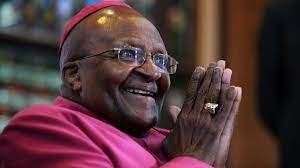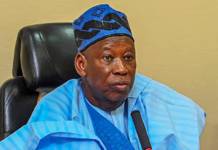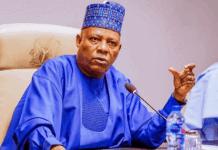President Muhammadu Buhari has condoled with President Cyril Ramaphosa, South Africans and the global Christian body, particularly Anglican Communion, over passing of Archbishop Emeritus, Desmond Tutu, 90, on Sunday, December 26, 2021.
President Buhari believes the death of the iconic teacher, human rights activist, leader of thought, scholar and philanthropist, further creates a void in a world in dire need of wisdom, integrity, courage and sound reasoning, which were qualities that the Nobel Peace Prize Winner, 1984, typified and exemplified in words and actions.
As a South African, global citizen and renowned world leader, the President affirms that the historic role Archbishop Tutu played in the fight against apartheid, enduring physical assaults, jail terms and prolonged exile, took him beyond the pulpit to global, political relevance, and his position, under President Nelson Mandela, in heading the Truth and Reconciliation Commission provided healing and direction for his country and the world.
President Buhari commiserates with Leah Tutu, the spouse of the spiritual leader and lifelong partner in the struggle against injustice, corruption and inequality, the Tutu family, board and staff of Desmond and Leah Tutu Legacy Foundation, Elders and Nobel Laureate Group, urging solace that the voice of the scholar and teacher, his published works, and inspirational quotes will resonate through generations, bringing more light and clarity to religious diversity, democracy and good governance.
The President prays for the repose of the soul of Archbishop Tutu, whose life and times sent an unforgettable message on love and forgiveness.
South African anti-apartheid icon Archbishop Desmond Tutu, described as the country’s moral compass, died on Sunday aged 90, sparking an outpouring of tributes for the outspoken Nobel Peace Prize winner.
The small-statured Tutu, who had largely faded from public life in recent years, was remembered for his easy humour and characteristic smile — and above all his tireless fight against injustices of all colours.
South Africa’s President Cyril Ramaphosa honoured this fight in a tribute to Tutu, announcing the archbishop’s death on Sunday.
“The passing of Archbishop Emeritus Desmond Tutu is another chapter of bereavement in our nation’s farewell to a generation of outstanding South Africans who have bequeathed us a liberated South Africa,” he said in a statement.
“Desmond Tutu was a patriot without equal; a leader of principle and pragmatism who gave meaning to the biblical insight that faith without works is dead,” he said.
“A man of extraordinary intellect, integrity and invincibility against the forces of apartheid, he was also tender and vulnerable in his compassion for those who had suffered oppression, injustice and violence under apartheid, and oppressed and downtrodden people around the world.”
Mourners gathered outside his former parish in Cape Town, St George’s Cathedral, while others massed at his home, some holding flower bouquets, according to an AFP journalist.
“It’s very very sad he died. He was such a good man,” said retired accountant Diane Heard.
The South African cricket team wore black armbands in his honour of the first day of the first Test against India in South Africa.
Also, President Muhammadu Buhari has extolled the virtues of Gov. Atiku Bagudu of Kebbi and former Speaker Yakubu Dogara on their birthday anniversaries on Dec. 26, describing them as committed party men.
Dogara was a former Speaker of the House of Representatives.
Buhari in a congratulatory message issued by his Senior Special Assistant on Media and Publicity, Malam Garba Shehu, on Sunday in Abuja, said: “I’m proud of your records of service to Nigeria and your people and indeed, our great party that is committed to change”.
According to the president, the two celebrants have individually distinguished themselves in their areas of responsibilities.
“You didn’t disappoint the voters that put you into office.
“Your records of performance have reinforced my belief that given the opportunity, our younger politicians have the capacity to deliver results.
“You’re a source of inspiration to other younger politicians.
“I wish you many more years on earth and good health in the service of Nigeria,” Buhari told the two politicians.
However, in recent years, Tutu slammed even the ruling African National Congress (ANC) — the vanguard of the fight against white-minority rule — for cronyism and nepotism after apartheid ended in 1994.
In the past, he has confronted homophobia in the Anglican Church, challenged Mandela over-generous salaries for cabinet ministers and stridently criticised the corruption that mushroomed under ex-president Jacob Zuma.
Ordained at the age of 30 and appointed archbishop in 1986, he used his position to advocate for international sanctions against apartheid, and later to lobby for rights globally.
Tutu was diagnosed with prostate cancer in 1997 and underwent repeated treatment.
His public appearances become increasingly scarce, and in one of his last this year, he emerged from hospital in a wheelchair to get a Covid vaccine, waving but not offering comment.
He retired in 1996 to lead a harrowing journey into South Africa’s brutal past, as head of the Truth and Reconciliation Commission.
For 30 months, the commission lifted the lid on the horrors of apartheid.
‘Larger than Life’
Tutu, with his instinctive humanity, broke down and sobbed at one of its first hearings.
“He articulated the universal outrage at the ravages of apartheid and touchingly and profoundly demonstrated the depth of meaning of ubuntu, reconciliation and forgiveness,” Ramaphosa said.
The Nelson Mandela Foundation called Tutu “an extraordinary human being. A thinker. A leader. A shepherd.”
“He was larger than life, and for so many in South Africa and around the world his life has been a blessing,” it said in a statement.
Tutu was born in the small town of Klerksdorp, west of Johannesburg, on October 7, 1931, to a domestic worker and a school teacher.
He trained as a teacher before anger at the inferior education system set up for black children prompted him to become a priest.
He lived for a while in Britain, where, he recalled, he would needlessly ask for directions just to be called “Sir” by a white policeman.
Tutu relentlessly challenged the status quo on issues like race, homosexuality and religious doctrine and gave his pioneering support for the assisted dying movement.
And he didn’t shy away from his own end.
“I have prepared for my death and have made it clear that I do not wish to be kept alive at all costs,” he said in an opinion piece in The Washington Post in 2016.
“I hope I am treated with compassion and allowed to pass on to the next phase of life’s journey in the manner of my choice.”
Tutu’s death came just weeks after F.W de Klerk, South Africa’s last apartheid-era president passed away on November 11.

























